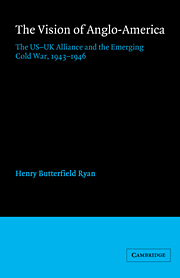Book contents
- Frontmatter
- Contents
- ACKNOWLEDGEMENTS
- INTRODUCTION
- PART I STRENGTHENING THE TIES: THE EFFORT AND THE PROBLEMS
- PART II FOREIGN CRISES THAT DEMONSTRATE GREAT BRITAIN'S PROBLEMS
- INTRODUCTION
- 5 Background and build-up
- 6 Involvement of Great Britain and the United States
- 7 Yalta and after
- 8 Truman: the new factor
- 9 The gathering for the San Francisco Conference
- 10 Between San Francisco and Potsdam
- 11 Concluding thoughts on the Polish crisis
- 12 Background of the crisis
- 13 1944, the critical year
- 14 The role of the press
- 15 The crisis peaks
- 16 America dives in
- CONCLUSION
- NOTES
- BIBLIOGRAPHY
- INDEX
9 - The gathering for the San Francisco Conference
from PART II - FOREIGN CRISES THAT DEMONSTRATE GREAT BRITAIN'S PROBLEMS
Published online by Cambridge University Press: 07 December 2009
- Frontmatter
- Contents
- ACKNOWLEDGEMENTS
- INTRODUCTION
- PART I STRENGTHENING THE TIES: THE EFFORT AND THE PROBLEMS
- PART II FOREIGN CRISES THAT DEMONSTRATE GREAT BRITAIN'S PROBLEMS
- INTRODUCTION
- 5 Background and build-up
- 6 Involvement of Great Britain and the United States
- 7 Yalta and after
- 8 Truman: the new factor
- 9 The gathering for the San Francisco Conference
- 10 Between San Francisco and Potsdam
- 11 Concluding thoughts on the Polish crisis
- 12 Background of the crisis
- 13 1944, the critical year
- 14 The role of the press
- 15 The crisis peaks
- 16 America dives in
- CONCLUSION
- NOTES
- BIBLIOGRAPHY
- INDEX
Summary
The months immediately after Yalta were among the most significant and sinister for subsequent East–West relations, with tension peaking during the latter part of April, just before the San Francisco Conference. With the Soviets alienating the new US Administration and with reports of their stubbornness beginning to worry the American public, it was a perfect moment for the British to stress the need for Anglo-American solidarity, and they did it admirably.
But before going further, we should note that Truman, almost surely uncertain still of the line his administration would take towards the Soviet Union, was, at this moment, subjected to an extraordinary barrage of hard – line advice, much of it from individuals who were in the United States for the conference. These included three especially - Eden, who, as we have seen, took as tough a line towards the Kremlin as any Western statesman, Harriman and John Deane, head of the US military mission in the Soviet Union. The latter two, fresh from the frustrations of dealing with Soviet bureaucracy, called for the US to be reasonable but firm in relations with the USSR. Harriman, in fact, had become consistently less sympathetic towards the Soviet Union during the time he had been posted there, particularly since the Warsaw rising.
During this pre-conference period there was a series of extremely important meetings in Washington with great significance for the future.
- Type
- Chapter
- Information
- The Vision of Anglo-AmericaThe US-UK Alliance and the Emerging Cold War, 1943–1946, pp. 103 - 112Publisher: Cambridge University PressPrint publication year: 1987

